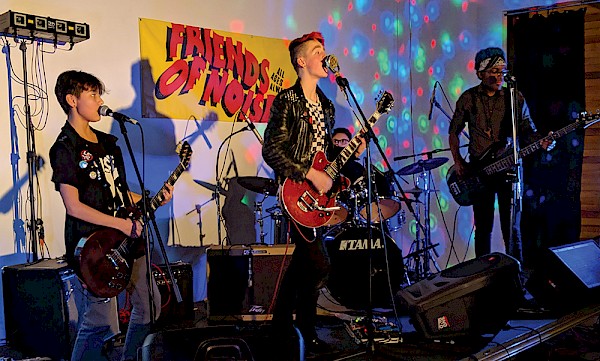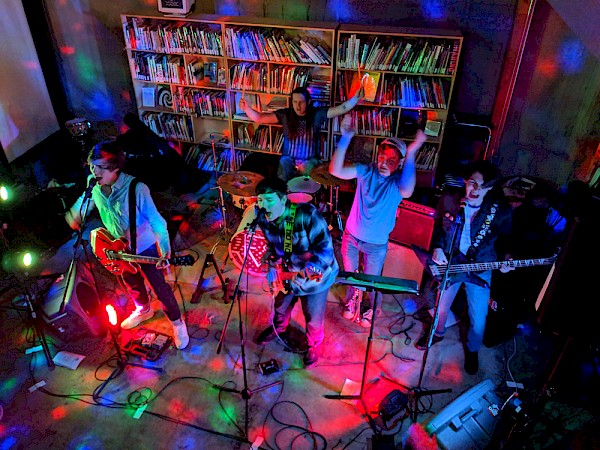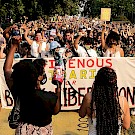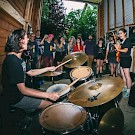 Under-21 rockers The Unknown Generation playing an all-ages Friends of Noise concert at Disjecta in February: Photo by Friends of NoiseAmidst the hairy underbelly of social supremacy that #MeToo, #BlackLivesMatter, #FatPower, #TransRights and other movements have unveiled in Portland and beyond, there’s a lot being said by younger people—particularly around creating safer public spaces and music venues. Students lead walkouts in protest of gun violence and climate change, they spend time talking about what “Consent is sexy and ongoing!” means, and they line school hallways with posters about gender identity that normalize the non-binary gender spectrum. Don’t let ageism influence how you see the future and who has say on said future: Students and younger people have a fresh perspective on social issues, which is a boon to us all. Younger people want to work within and understand a realistic framework of oppression, and we can lend them all our ears.
Under-21 rockers The Unknown Generation playing an all-ages Friends of Noise concert at Disjecta in February: Photo by Friends of NoiseAmidst the hairy underbelly of social supremacy that #MeToo, #BlackLivesMatter, #FatPower, #TransRights and other movements have unveiled in Portland and beyond, there’s a lot being said by younger people—particularly around creating safer public spaces and music venues. Students lead walkouts in protest of gun violence and climate change, they spend time talking about what “Consent is sexy and ongoing!” means, and they line school hallways with posters about gender identity that normalize the non-binary gender spectrum. Don’t let ageism influence how you see the future and who has say on said future: Students and younger people have a fresh perspective on social issues, which is a boon to us all. Younger people want to work within and understand a realistic framework of oppression, and we can lend them all our ears.
Jenna Harper is a community consent educator in the Portland Public School system. She teaches healthy relationships and consent education at Roosevelt and Jefferson high schools, though the curriculum she’s developed is heavily leaned on across Multnomah County. She’s been working in the field of consent education and sexual trauma recovery for more than 10 years, and she says that the students she works with often have a greater understanding of oppression and power dynamics than many adults she encounters. Her curriculum covers Consent 101; Gender and Sexual Identities; Gender and Sexuality in the Media; Porn, Race, Class and Gender in the Framework of Oppression; and a bunch of other topics we could all sink our teeth into. Harper says that, particularly with the Gender in the Media studies, students are strengthening their media literacy by analyzing local and popular music, from Ariana Grande’s “Thank U, Next” (a song dedicated to self-love and personal growth) to words written by local rapper The Last Artful, Dodgr. Students in her class have written poetry and songs that deal with sexual violence, she says, and have turned to creative expression for healing and understanding of oppression and gender-based violence.
 Youth rockers Good I'm Glad playing an all-ages Friends of Noise show at PICA in March: Photo by Friends of NoiseAndre Middleton runs Friends of Noise, a nonprofit that advocates for all-ages concert venues and educational opportunities for youth. Friends of Noise has a long list of goals centered around making the music industry more accessible by working towards opening more small and midsized, all-ages venues or youth-focused arts complexes.
Youth rockers Good I'm Glad playing an all-ages Friends of Noise show at PICA in March: Photo by Friends of NoiseAndre Middleton runs Friends of Noise, a nonprofit that advocates for all-ages concert venues and educational opportunities for youth. Friends of Noise has a long list of goals centered around making the music industry more accessible by working towards opening more small and midsized, all-ages venues or youth-focused arts complexes.
“All-ages music is much bigger than having shows in safer places where the under-21 crowd is welcome,” Middleton says. “It’s creating an ecosystem, with intention, that is inclusive and nurturing to artists and audiences of all ages. Concerts need to have under-21-year-old artists on stage as well as in the audience.”
To get to a point where younger bands and musicians can access the same resources as 21-and-over artists will take collaboration between the city, OLCC, venues, club owners, families, and bands and musicians. Some of those steps include advocating for youth acts to open at midsize rooms, hosting professional development workshops for teens so they develop the skill sets to navigate our music ecosystem, and providing space for all-ages pop-up concerts.
While most consent and sex education programs have a long way to go (there are still abstinence-oriented programs in Oregon that ban the use of words like penis, vagina and intercourse), it’s clear that across the board a lot of students and younger subcultures (particularly disenfranchised youth in the anarcho-centric punk culture in Portland) often have a stronger and more compelling grasp on how to ask for consent, what that looks like in an arts scene, and how they practice it as the culture around consent and gender changes.
Olivia Awbrey is a songwriter, multi-instrumentalist and activist from Portland.








